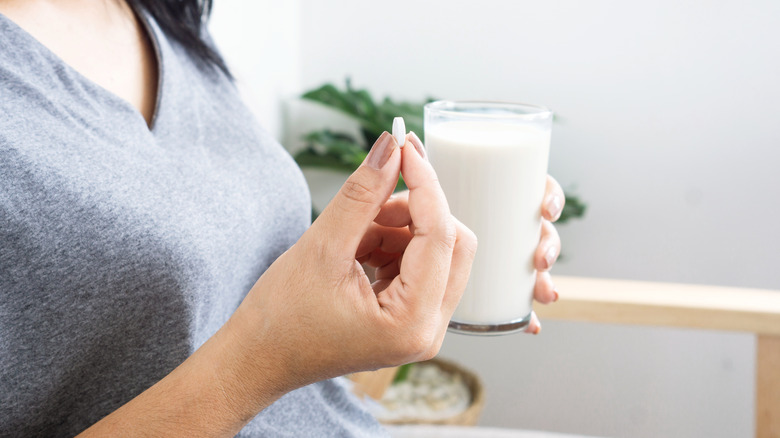Why You Shouldn't Take Iron And Calcium Supplements Together
Most people do not need to take iron and calcium supplements in order to get enough of these essential vitamins and minerals. A balanced diet that contains a variety of foods is often more than enough to stay healthy and avoid deficiencies. But if you're someone whose doctor has recommended supplements, it's a good idea to know the best way to take them so you're getting the greatest health benefits.
Iron and calcium are needed for very different reasons. Iron is one of the most important minerals for making hemoglobin, an essential part of the makeup of our red blood cells (via University of Michigan). Hemoglobin helps carry oxygen throughout your body. Without the proper amount of iron, you may develop a condition known as iron deficiency anemia, which may cause you to feel tired and get sick more easily than others (via Healthline). Low hemoglobin levels can be caused by blood loss, diets low in iron-rich foods, menstruation, and medical conditions that require the body to use up more iron. Women and people over the age of 65 are especially susceptible to anemia.
It's best to take each supplement separately rather than at the same time
Calcium helps support bone growth and promotes a healthy heart, nerves, and muscles (via Mayo Clinic). Typically, the proper amount of calcium can be found in a healthy diet that includes dairy and certain vegetables. For people that can't get enough calcium in their diet, supplements may be needed. Children and older adults are most at risk for medical problems if they don't get enough calcium. Adults can develop a weakening of the bones known as osteoporosis, and children may not reach their full potential height if their bones don't have enough calcium to grow properly.
So what should you do if you need to take both iron and calcium supplements? Medical experts are conflicted about taking iron and calcium together. Some studies have shown that a diet high in calcium, but low in iron foods, can reduced iron absorption by as much as 50% (via LiveStrong). Meanwhile, another study in which calcium supplements were given to pregnant women did not show any changes in iron absorption when coupled with the calcium. Despite conflicting studies, doctors continue to recommend that people needing both types of supplements wait at least two hours after taking iron before taking calcium, just in case they have a negative effect on one another.


